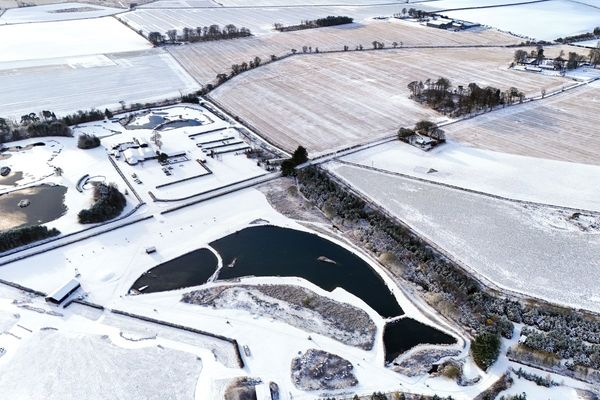African leaders are meeting in Brussels on Thursday with European leaders for a two-day summit that will inevitably discuss growth and trade. However, signing the long-awaited economic partnership agreement with the East African Community (EAC) regional bloc remains off the agenda, according to the Tanzanian Ministry of Investment, Industry and Trade.
Tanzania, one of the six members of the EAC, has long been the stumbling block of the trade agreement.
Addressing rumours circulating on social media, a statement signed by trade ministry spokeswoman Suzan C. Mshakangoto, reads: “Tanzanian position has not changed, the information spreading does not come from any official source."
Not happening yet. #Tanzania not signing the @jumuiya @EU_Commission #EPA pic.twitter.com/NiQwrwjedI
— AFRICA KIIZA (@africakiiza) February 15, 2022
The European Council president, Charles Michel, the European Commission chief, Ursula von der Leyen, and other European leaders will be meeting African leaders, including Kenya’s President Uhuru Kenyatta, who has already indicated that the deal is ready for signature.
In an interview earlier this month with The East African, a Kenyan paper, Michel said that Kenyatta, as the current president of the EAC, hinted that Tanzania was ready and could possibly sign at the EU-AU summit.
Long wait
Negotiations for the Economic Partnership Agreement (EPA), were finalized in 2014 but it has taken eight years and a change in governments to put it on the right path.
Tanzania, and in effect, President Samia Suluhu Hassan, maintains an integral part of the puzzle, according to Harrison Mbori, a law researcher with the Max Planck Institute in Luxembourg.
“[The then Tanzanian president] Magufuli had been more protectionist about issues from investment to trade to all other economic issues, and Suluhu Hassan has shown to be much more liberal,” Mbori tells RFI.
The pact, which involves all six members of the East African Community (EAC), including Burundi, Kenya, Rwanda, South Sudan, Uganda and Tanzania, can only enter into effect if it is signed and ratified by all six countries.
Why Tanzania is uncertain
At the time, Magufuli was not the only naysayer in the process; former Tanzanian president Benjamin Mkapa gave concrete reasons in 2016 why the EPA would not benefit the country.
“When the EPA is implemented, 335 of the 983 products we currently produce would be protected in the EPA’s sensitive list, but 648 tariff lines would be made duty-free; i.e. the existing industries on these 648 tariff lines would have to compete with the EU’s imports without the protections of tariffs? Will these sectors survive the competition?” he asked.
Tanzania, as a Least-Developed Country (LDC), already enjoys an EU preference scheme called Everything But Arms (EBA) and exports to the EU duty-free and quota free. Veteran statesman Mkapa maintained he could not justify Tanzania signing the treaty in 2016.
Mkapa warned of another aspect of the treaty that ties in previous colonial models of Western countries importing raw materials, not manufactured goods.
He stated that the African market buys the EAC’s manufactured goods, not the European market, which takes 91 percent of its trade with EAC in primary commodity exports, like coffee, tea, spices, fruit and vegetables and fish.
“The EU has a raw materials initiative aimed at accessing non-agricultural raw materials found in other countries,” he wrote, and securing reliable and unhindered access to raw materials is important to the EU.
This EPA prohibits signatories from introducing new export taxes or increase existing ones.
Tanzania and the other EAC countries have rich deposits of tungsten, cobalt, tantalum and other minerals, and the inability to levy taxes on natural resources such as these run against the region’s “objective to industrialise and add value to our resources,” he wrote.
Kenya’s quandary
Rwanda and Kenya have already signed the EPA, and Kenya ratified it in 2016. Both countries had pushed Tanzania to accept the EU’s terms on the treaty, which includes labour points, dispute resolution and transfer for technology.
Under Magufuli, Tanzania even attempted to block members of the EAC from signing the agreement with the EU, an application that was rejected by the East African Court of Justice in 2017.
-
Europe counters China's Belt and Road strategy with plans for €150 billion investment in Africa
-
France's Macron hosts Tanzanian counterpart in Paris ahead of EU-AU summit
Although these items are in the treaty, researcher Mbori says that the points are not as beneficial as many would like.
“There’s been a problem of protection for the flower farmers - they are not getting their fair share of the money that is being produced out of this and the benefits of some of these commodities that are going into Europe,” he says.
Flower producers in Kenya are also worried that the EU’s Green Deal could ban most pesticides used in the industry, which could stymie commerce with the European bloc.
A sustainable impact assessment commissioned by the European Commission’s Directorate-General for Trade indicated that Kenya’s flower market would only lose out if the EAC agreement was not implemented because its preferential market access would be removed, resulting in a production decrease and loss of employment.
The study also showed that the deal would be positive for the EAC, “except that the effects on the environment would be uncertain.”
However, if codes of conduct are not implemented and respected, the expected increase in production would put pressure on the environment, it added.
The European Parliament noted it considered the impact of environmental factors low, primarily because of the lack of data.
Tanzania’s main export market is the United Kingdom, and with Brexit, Magufuli did not deem it necessary to sign the EU-EAC agreement. Kenya was worried it was not going to maintain its relationship with the UK, says Mbori.
“In 2020, Kenya decided to sign an EPA agreement with the UK, which is a direct lift of what had already been negotiated by the EU,” he says, and Tanzania is looking to do the same, with the same agreement.
“There were no new negotiations; they used the template that had already been used by the EU,” he says, adding, “This is the hole that Tanzania is also going to fall into, with the UE and the UK.”
Tanzania’s Trade ministry indicated that it is continuing discussions with the EU on the text.
The government “will engage the EU in technical consultations to ensure that the proposed agreement consistently addresses interests that are of benefit not only to Tanzania but for the EAC at large,” said the statement, adding that it will announce the status of the agreement when technical consultations have ended.







